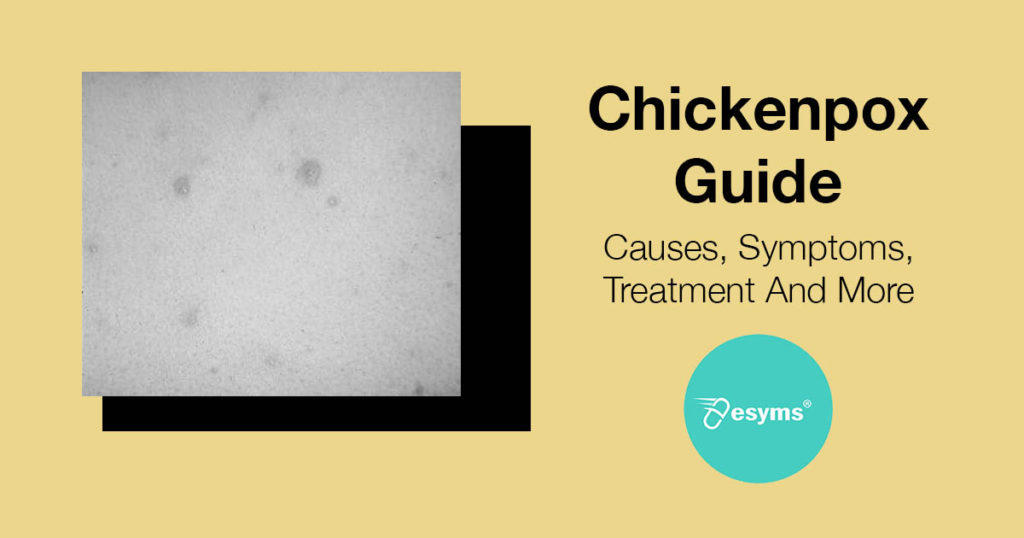Chickenpox Guide – What Is Chickenpox, Symptoms, And More
Chickenpox is a highly contagious infection caused by the Varicella-Zoster virus. It is common among kids and can spread rather quickly in crowded places like nurseries or kindergartens, hence, it is important to spot signs early and isolate your child to prevent spread.
BROWSE OUR GUIDE

Health Disclaimer
The contents of this article is meant as general health information and should not be treated as professional medical advice. If you need professional medical help, please consult your healthcare practitioner.
What Is Chickenpox?
According to the CDC, Chickenpox is a highly contagious infection caused by the Varicella-zoster virus (VZV). It appears as an itchy rash across the entire body. It is common among children and can be serious when it infects those with weakened immunity such as the elderly, pregnant women, young children and those with diseases that weaken the immune system.
Chickenpox And Monkeypox - What’s The Difference?
Chickenpox and Monkeypox are often confused because their most significant symptom is rashes. Both of the viruses also cause symptoms such as cold, body ache, fever, muscle ache and fatigue. They can be differentiated by observing different aspects. Firstly, Chickenpox is caused by Varicella-zoster virus which is highly contagious while Monkeypox is caused by the Orthopoxvirus. Chickenpox can be fatal whereas Monkeypox is rarely fatal.
Besides that, Monkeypox patients will develop rashes within 1 to 5 days and it starts from the face and spreads to other parts of the body later. As for Chickenpox, rashes can be observed on the chest, back and then on the face and the entire body. Anywhere between 250 to 500 itchy blisters may show up. Thirdly, in Chickenpox, the lymph node is typically not swollen. This is not the case for Monkeypox. Lastly, The incubation period of Monkeypox is from 5 to 21 days while chickenpox is 4 to 7 days.
How Is Chickenpox Transmitted?
Chickenpox can be transmitted from person-to-person via touching the blisters, saliva or mucus of an infected patient. The virus can also be transferred via airborne means – coughing and sneezing.
Is Chickenpox Contagious?
Chickenpox starts to become contagious 1-2 days before the onset of the rashes, all the way until all of the Chickenpox lesions have scabbed. Even if you are vaccinated, you may still get Chickenpox. If you do, you may develop lesions that do not crust and are contagious until no new lesions are visible for more than 24 hours.
Who Is At Risk Of Getting Chickenpox?
The following groups of people are at higher risk of getting Chickenpox:
- Newborns and infants whose mothers never had chickenpox or the vaccine
- Adolescents and adults
- Pregnant women who haven’t had chickenpox
- People who smoke
- People whose immune systems are weakened by medication or diseases
- People who are taking steroid medications for another disease or condition, such as asthma
- Unvaccinated individuals
Chickenpox Symptoms
Symptoms start to show 10 to 21 days after exposure to the virus. The symptoms usually last between 4-7 days. Classic symptoms of Chickenpox include rashes that turn into itchy, fluid-filled blisters that eventually turn into scabs. The rash may first show up on the chest, back, and face, and then spread over the entire body. It takes about 1 week for the blisters to turn into scabs. You may also experience fever, tiredness, loss of apetite and headaches 1-2 days before the rashes appear.
Treatment Of Chickenpox
Typically, Chickenpox will go away on its own when managed well. If you do get Chickenpox, your doctor may prescribe Calamine Lotion for your rashes and Paracetamol for your fever. Other measures include drinking lots of water, keeping your hands clean and isolating yourself or your child to prevent transmission. Your doctor may also recommend antiviral medication if you fall into the high-risk / danger groups of people.
Vaccines For Chickenpox In Malaysia
The vaccine for Chickenpox is called the Varicella vaccine, and has been available in Malaysia since 1997. It is essentially a weakened version of the Varicella-zoster virus. For children between 12 months to 12 years of age, one dose of the vaccine is required. If you’re above 12, you’ll need 2 doses with at least 28 days interval between the both doses. Please consult your doctor for more information about getting vaccinated.
What Is The Mortality Rate Of Chickenpox?
According to the CDC, the mortality rate is 1/100,000 cases among children aged 1-14, 6/100,000 for those aged 15-19 and 21/100,000 among adults. Most deaths came from those with weakened immune systems.
Chickenpox Prevention Tips
Prevention is always better than cure, so it is highly recommended to get the Chickenpox vaccine. If you’ve identified a Chickenpox outbreak in a certain area, be sure to avoid going there. Besides that, keeping your immune system strong and maintaining good hygiene such as by washing hands frequently is a good idea.
If you have any questions about Chickenpox or other health related issues, you can speak to our pharmacists via our telepharmacy service below.
